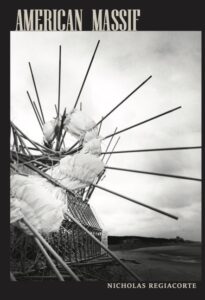Poet Nicholas Regiacorte joins me to today to talk a little about his new collection, American Massif.

Bio:
Nicholas Regiacorte is the author of American Massif, published by Tupelo Press. His poems have appeared in 14 Hills, Copper Nickel, Mary, New American Writing, Descant, Bennington Review, Colorado Review, Verse Daily, Dialogist and elsewhere. Currently, he teaches at Knox College, where he directs the program in creative writing.
Welcome, Nicholas. What do you enjoy most about writing poems?
Surprise. Since I started, up to this day, the most exciting thing about writing is the prospect of being surprised—by some bit of truth or beauty of music I didn’t rehearse.
Can you give us a little insight into a few of your poems – perhaps a couple of your favorites?
“American Mastodon wades through security” is a dialogue between A.M., bent on getting to his mother’s bedside, and TSA agents, who are only doing their job. Though the lines do not correspond neatly to single speakers, they do perform the contest between one’s urgent desire and the world’s indifferent authority. A.M. is outnumbered, his strength in total reduced to weakness in parts. Though this wasn’t the first iteration of A.M.’s voice, it was the first clearest demonstration in form whereby one thing is leveraged against another. When obedience and bribes don’t work, A.M. invokes the authority of his mother–as though even strangers should understand that, as though the example of her self-sacrifice, or mention of her Pietà statue might inspire the agents to release him, to show him some mercy. Instead, as with his other attempts to reason and to distract, they disarm him of this, too. This isn’t to make A.M. out to be a Christ figure. But maybe they understand better than he how pietà only comes after submission.
Among the cast of characters we encounter are dear ones, strangers, a surgeon, a mathematician, a prostitute, a murderer, and a strandbeest. A.M. can get along with most, except Dire Wolf. In “American Mastodon toys with an explosive device” he is only partly “toying” with Dire Wolf. In spite of his happiness, and having started a human family, A.M. reckons with this growing adversary in himself, a pack-cynic. Many lines display the pleasures of the human and mundane–though all are precariously exposed to the destroyer’s voice. In their kind of call & response, the Dire Wolf appears to dominate until A.M. realizes that he is armed–with an ingenious invention, his child’s watercolor (inspired by my son’s actual picture). In the real world, perhaps it is useless and flammable. But in him he believes it has great imaginative and therefore lethal—or redeeming power, as the child does.
What form are you inspired to write in the most? Why?
I err on the side of improvised form, or free verse. Though, I love metered verse and can remember a number of poems because of their music. Otherwise, I am probably most compelled by voice—as in persona poems, never tiring of Zbigniew Herbert’s Mr. Cogito, for instance.
What type of project are you working on next?
After the publication of American Massif, I continued to write American Mastodon poems. But then, last year I shifted to a different voice. Upon hearing of an old acquaintance’s untimely death, albeit seven years late, I started rereading A.M. poems more and more skeptically. I started jotting notes in the righthand margins—arguing with A.M., disputing images, refuting his assumptions. I started to think of these notes as things Ingrid might say. After a few months, I realized that these could be poems. After nine months of this near call-and-response, I have a rough manuscript about the one creature, A.M. still aspiring to evolve into human company, another—Ingrid reluctantly called back into life, to meet him.
When did you first consider yourself a writer / poet?
One answer is: when I started to take myself seriously, in college maybe, certainly in grad school at Iowa. The real answer is when I learned to laugh at myself while still feeling the urgency of poems. This probably happened the year I first lived in southern Italy, in a seaside town that stank of garbage in warm months. I rented an airy apartment–in which the shower was nothing but a drool and I had to use a little propane stove, in the winter, in order to heat a little area in which to think straight and work. Why consider myself a poet then and there? I was alone, stumbling through language, chaos and beauties of all kinds. I think I felt like a “poet” because I’d never been freer to write, never at such a loss for words.
How do you research markets for your work, perhaps as some advice for not-yet-published poets?
While I’ve always felt artistically driven, I was never professionally ambitious enough. What I wish I’d done when in grad school was to look at the acknowledgements page of books I loved, then sent work to the journals listed there–which is what I do now, however sporadically.
What would you say is your interesting writing quirk?
I think about magic a lot. Not that I’m a closet magician. Maybe it’s more accurate to say I think of eucharist and transformation, often calling on my memory of college chemistry and doing titration. I loved the suspense of waiting for beaker B to flush with a new color when its substance was transformed. It is very much the kind of suspense I crave in writing poems.
As a child, what did you want to be when you grew up?
Hard to say. Though, as an altar boy, I do remember pretending to say mass, when I wasn’t playing in the woods by myself. I grew up in Cumberland, Maine, on a few acres of pinewoods, 20 minutes north of Portland. So I pretended to be a lot of things, but never a writer or teacher.
Thanks for being here today!
